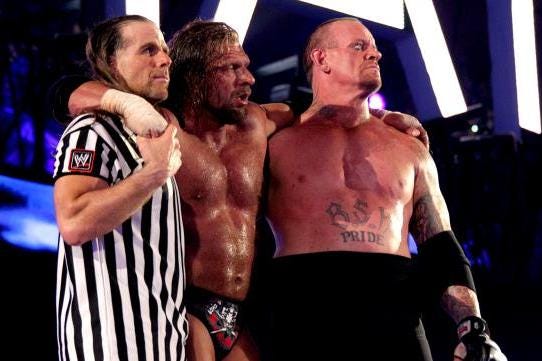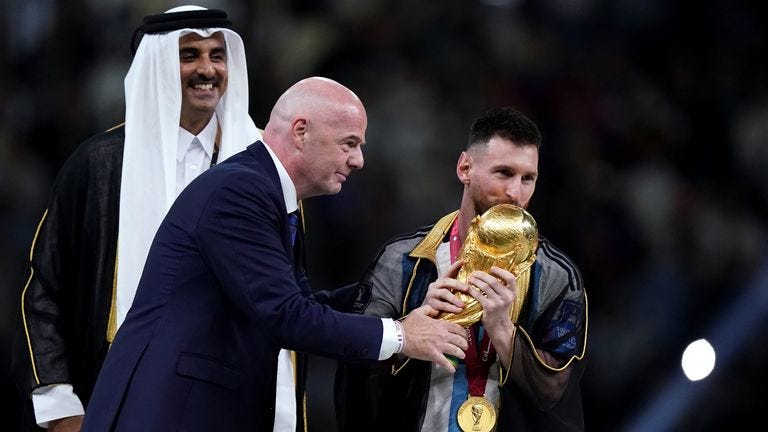The End of an Era
The conclusion of the Qatar World Cup marks the conclusion of an era in football and a progression onto a new stage.
In each sport there are many different eras, falling under different names, converging on each other. Most end suddenly. Few have been defined by a trinity of iconic stars as much as this one has. Three legends. The culmination of a storyline that had begun over 4 years previous to this, but which truly had been going since these three men had separately begun their careers on the grandest stage. I’m of course referring to the iconic “End of an Era” match between Triple H and The Undertaker (with Shawn Michaels as Special Guest Referee) that took place at WrestleMania XXVIII. But I could just as likely be referring to our latest FIFA World Cup.
The 2022 edition in Qatar was likely the last time we will see all three of this era’s greatest footballers in the same tournament together. Messi, Ronaldo, and Neymar. And the end of these illustrious careers is not the only thing we will see pass by in the coming years.
Despite the differences between the sports that have provided these moments for us, both were a turning point for the entirety of their sport’s history, and it truly is astounding how similar these moments in time are.
With the End of an Era match, this would not be the last time these men performed, nor would it be the last time they shared the stage together. It could not even be pinpointed as the actual moment the peak of the era ended. That era had finished up long before, and the new stars that had been influenced by their brilliance had already made their names, possibly even taking a grasp on legendary status already in their comparatively young careers. It did, however, function as a hugely symbolic moment for the end of one era of the sport and a progression into an entirely new one, complete with new stars, new rules, and new formats.

This World Cup ending does truly mark the passing from one of era of Football to the next. While this is not the last time we will see all of these iconic names on a football pitch, both in general or even playing against each other, this is sure to be the last time we see them anywhere near the peak of their powers. Messi and Neymar will head back to Paris Saint Germain in the coming days and weeks ready to perform to the best of their abilities for the rest of this season, but the constant physical and emotional exertion of this World Cup is sure to have taken a tonne out of them (I know it has for me). Cristiano seems to be finished, off to complete his career amongst lavish surroundings in Saudi Arabia, if all the rumours are to be believed. While the youngest of the three may have, to quote the World’s Strongest Man, Mark Henry, “A lot left in the tank”, Messi and Ronaldo are 35 and 37, and no man can escape the ever-creeping grip of time. Decline is bound to happen.
These three are the first generation of icons to play in Football’s gilded age. This era of football will be defined not just by their individual play, but also by the worldwide popularity of the Premier League, La Liga (though dwindling now the top three stars have all left), and the Champions League, by the constantly skyrocketing demands for television rights, and by an insatiable lust inside the game’s leadership to capitalise monetarily on this sport becoming what the historian David Goldblatt has called the “biggest cultural phenomenon the world has ever known.”, not for the good of the game going into the future, but for the good of their own bank accounts.
Sports clubs across the globe in this generation have turned into the ultimate status symbol amongst the rich. The subject of squabbles between oil-rich nation states and oligarchs, sheikhs and vulture funds, all rushing to co-opt the most notable showpieces of the game in order to advertise the newest ways they’ve “discovered” for people to save themselves from the monotony of life that they have created by ripping away the everyday moments of joy that past generations experienced, and to grow themselves politically so that they can latch on to any amount of power that is within reach in this modern world.
We move now onto a new era of Football, one that more likely than anything will be defined not by the action on the pitch but by the dodgy dealings that go on in the privately owned commercial boxes surrounding the pitch. The tournaments we know and love, which have seemingly already reached their perfect forms, are changing to make them longer, more populous, to make sure there are many more marquee matches, and eventually will end up being so frequent that they become stale, Much like the “Hell in a Cell” stipulation that housed this era ending match, which has now become a regular feature once a year on a special “Premium Live-Event” . These huge face-offs are set to become a part of the everyday, rather than the festival occasions they should be. With the new generation, we can already see how these stars of the game will be used to further Football as a global phenomenon, as the key stars of our previous generation have begun to gather together under the golden briefcases of cash being doled out by the Kingdom of Saudi Arabia for being ambassadors to their 2030 World Cup bid. Others are sure to follow, as many of our top footballers and managers have made their questionable morals and political views and beliefs well known over this World Cup cycle. They won’t shy away from the glint of gold when that offer comes.
For all of those top players from the last decade, whenever the ending comes for them, Qatar is goodbye, au revoir, auf weidersehen, a final hurrah for the most spectacular members of football’s golden age. As Ryan Hunn noted with Musa Okwonga on their “Stadio” podcast that he felt “like this was a World Cup that suited the era that we are in as a planet actually. It feels like all roads have been leading to this point and now whatever the future will be is not something that we have ever experienced, and no one, I don’t think, is prepared for”. That the final stand of this era should come along in the form of a tournament dedicated to an unparalleled level of faux glamour. Played out in stadiums built lavishly, gilded in the sweat, blood and lives of people who don’t have the means to be part of the spectacle that their work created, slaving away for pennies in a land where money is no object, a land that has risen out of the arid desert by squashing to death those who were already downtrodden, and only been drawn to this game that so many hundreds of millions of people across the globe love so dearly because of the seemingly irresistible appeal of further wealth and power that hosting it can bring.
All we have in this life is hope. Hope that our game can return in some way to a focus on the community, whether that community be local or global, rather than a focus on revenue streams and diversification of income. But the memory of the World Cup presentation ceremony, the images of Gianni Infantino gripping the World Cup tight and almost refusing to give Lionel Messi the trophy until enough time had been spent focusing on the host nation and FIFA’s role in the competition have dwindled that flame of hope down to the smallest ember. This era is done, and there will be no time given to a moment of humanity atop the stage for those who have made us bark, cry, leap with joy and crumple into a ball of anger. Not unless it can be monetized.
But who knows. Maybe I’m wrong. Hopefully I’m wrong.


